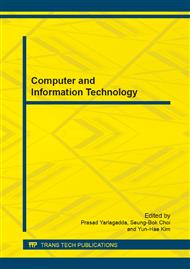p.450
p.458
p.462
p.469
p.473
p.477
p.485
p.491
p.496
Research and Implementation of Intelligent Traditional Chinese Headdress System in Computer Animation
Abstract:
Traditional Chinese headdress is an important part of the traditional Chinese culture, which provides rich material for computer animation. The creation process of traditional Chinese headdress model in computer animation is complex working and time-consuming. This study establishes the traditional Chinese headdresses database, which covers from Tang Dynasty to Qing Dynasty. According to the characteristics of the traditional Chinese headdress, this study develops an intelligent Traditional Chinese Headdress system by MEL, which can import models into the scene and change attributes related with models efficiently. The system is the combination among computer technology, animation art and traditional Chinese culture. It will improve the efficiency and quality in the computer animation creation.
Info:
Periodical:
Pages:
473-476
Citation:
Online since:
February 2014
Price:
Сopyright:
© 2014 Trans Tech Publications Ltd. All Rights Reserved
Share:
Citation:


